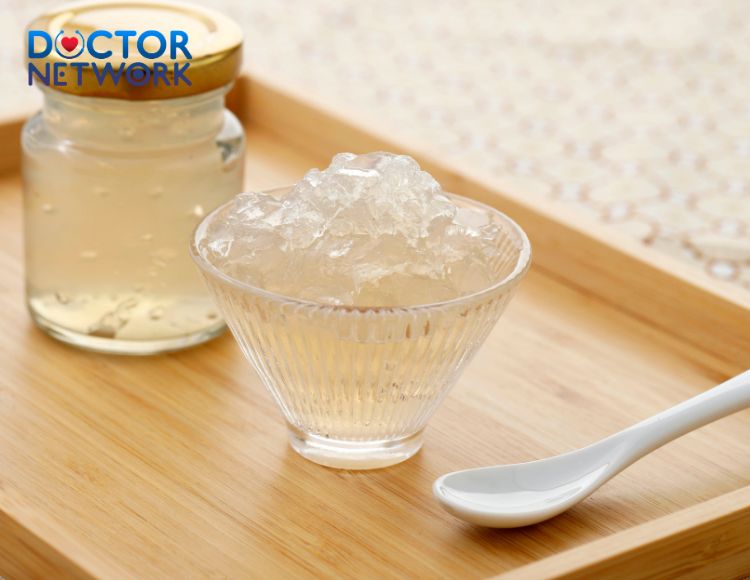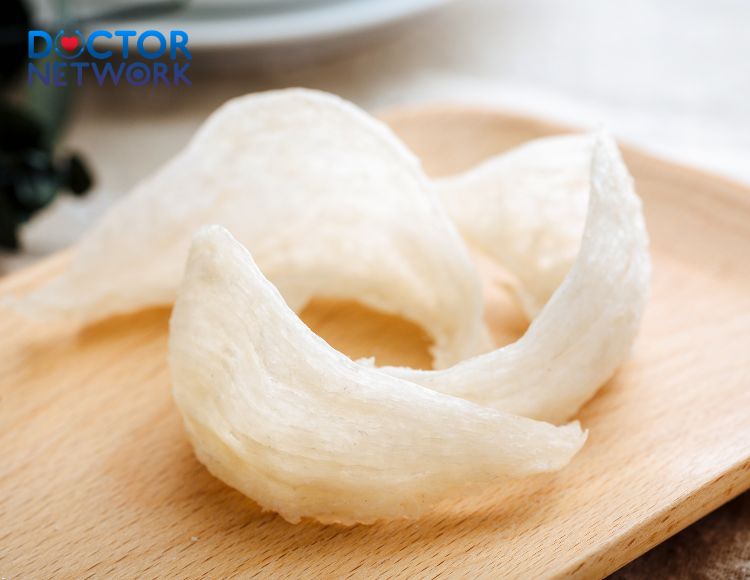In the Eastern culinary tradition, bird’s nest soup has long been regarded as a precious and nutritious food source for various demographics. For children, consuming bird’s nest with appropriate dosage and method can bring many benefits to their development. However, many parents still have concerns about “the dosage of bird’s nest for children” to ensure it is rational and safe. This article will provide useful information to address these concerns.
Benefits of Bird’s Nest for Children’s Development
Bird’s nest is the nest of swiftlets, primarily formed from the bird’s saliva. It contains high levels of protein, essential amino acids, and numerous trace elements such as calcium, iron, potassium, etc. That’s why bird’s nest brings excellent health benefits such as:
Providing nutrients, supporting physical development: The nutrients in bird’s nest promote growth, strengthen bones, and enhance overall health for children. Boosting the immune system: Some studies indicate that components in bird’s nest can positively impact a child’s immune system, increasing resistance and reducing the risk of infections. Improving brain function, cognitive abilities: Bird’s nest contains some nutrients believed to be beneficial for brain development, contributing to smarter, more active children. Enhancing digestion: In children, the digestive system is still delicate. Bird’s nest with its soft, easily digestible structure can support the digestive process and reduce constipation issues.
Recommended Dosage of Bird’s Nest by Age
Using bird’s nest for children is necessary, but “the dosage of bird’s nest for children” is an important issue. The dosage depends on the child’s age:
- “the dosage of bird’s nest for children” – Children under 1 year old: Not recommended to use bird’s nest. The child’s digestive system is still very weak, unable to fully absorb nutrients and may cause intestinal discomfort. Children from 1-3 years old: Children can start getting used to bird’s nest. The dosage is about 2-3g/dose, used 2-3 times/week.
- “the dosage of bird’s nest for children” – Children from 1-3 years old about 2-3g/dose, used 2-3 times/week

- “the dosage of bird’s nest for children” – Children from 3-10 years old: The dosage can be increased to 3-5g/dose, with more regular use, perhaps 3-4 times/week. Children over 10 years old: Can be used more frequently, regularly every day to supplement energy for physical and mental activities.
- “the dosage of bird’s nest for children” – Children over 10 years old can be used daily

Special Note: Parents should consult a pediatrician or nutritionist to determine “the dosage of bird’s nest for children” that is safest and most suitable for their child’s condition.
Effective and Safe Use of Bird’s Nest for Children
- “the dosage of bird’s nest for children” – Choose high-quality bird’s nest: Prioritize bird’s nests that are refined, clean, and from guaranteed sources. This helps limit impurities, bacteria affecting children’s health.
- Proper, correct processing: Use gentle heating methods to preserve the nutrients in bird’s nest. It can be combined with ingredients like red dates, lotus seeds, etc., to make the dish more appealing. (how to use bird’s nest for children)
- “the dosage of bird’s nest for children” – Timing of bird’s nest consumption: Children should eat bird’s nest in the early morning on an empty stomach or in the evening before bed to maximize absorption.
- Monitor the child’s reactions: After using bird’s nest for children, if there are any unusual signs (allergies, diarrhea, etc.), temporarily stop and seek advice from experts.

“the dosage of bird’s nest for children” – Choose high-quality bird’s nest
Important Notes When Using Bird’s Nest for Children
- “the dosage of bird’s nest for children” – Avoid overuse: Despite being nutritious, excessive consumption of bird’s nest is not good and may cause bloating, indigestion (how much bird’s nest should children eat).
- Pay attention to overall dietary regime: Bird’s nest is only a supplementary food, it needs to be combined with a healthy, balanced diet.
- Cases of restricted use: Children with a history of allergies, respiratory, or digestive issues.
Some frequently asked questions regarding “the dosage of bird’s nest for children”
Here are 5 commonly asked questions related to the topic of “the dosage of bird’s nest for children,” along with detailed answers:
At what age can children eat bird’s nest?
It is not advisable for children under 1 year old to consume bird’s nest due to their delicate digestive system. “the dosage of bird’s nest for children” – Children from 1-3 years old can start with a small dosage, about 2-3g/dose, 2-3 times/week. Consulting a pediatrician or nutritionist will help determine the appropriate timing and dosage of bird’s nest for your child.
Is it good for children to consume a lot of bird’s nest?
Although bird’s nest is nutritious, it should not be overused, exceeding the recommended dosage. Consuming too much bird’s nest for children can lead to:
Indigestion, bloating, poor nutrient absorption. Dependency on bird’s nest, neglecting a diverse diet. Limited significant effects, resulting in wastage.
Can allergic children eat bird’s nest?
Children with a history of allergies (especially protein allergies) need to be particularly cautious. For the first time, give the child a very small amount to try, and monitor for 24 hours. If any signs of allergies appear (rash, diarrhea, difficulty breathing, etc.), stop immediately. It’s best to consult an allergist before giving bird’s nest to children.
Is it better for children to eat bird’s nest in the morning or evening?
Both times have benefits:
Morning (on an empty stomach): Nutrients in bird’s nest are best absorbed. Evening (before bedtime): Supports better sleep quality. Parents can choose the appropriate time according to their child’s habits.
Can sick children consume bird’s nest?
When children are ill, their immune system is weakened, and digestion and nutrient absorption are not as efficient as usual. Priority should be given to easily digestible, light foods. Nutritious foods like bird’s nest can be consumed when the child is recovering. For children with underlying medical conditions or severe illness, consult the treating physician before giving them additional supplements, including bird’s nest.
Scientific Evidence Related to “the dosage of bird’s nest for children”
Scientific evidence on “the dosage of bird’s nest for children”:
- Study on the immune effects of bird’s nest on children:
Author: Zhang, Y., et al. Article Title: “Bird’s Nest and Its Immunomodulatory Effects” Journal: International Journal of Preventive Medicine and Community Health, 2015 Conclusion: Bird’s nest can enhance children’s immune system by activating immune cells and increasing antioxidant production.
- Study on the impact of bird’s nest on children’s cognitive development:
Author: Li, Y., et al. Article Title: “Bird’s Nest and Its Effects on Cognitive Function in Children” Journal: Asian Clinical Nutrition Journal, 2017 Conclusion: Bird’s nest may improve memory, concentration, and learning ability in children.
- Recommended dosage of bird’s nest for children:
According to the National Institute of Nutrition of Vietnam:
Children from 1-3 years old: 2-3g/dose, 2-3 times/week. Children from 3-10 years old: 3-5g/dose, 3-4 times/week. Children over 10 years old: 5-7g/dose, 4-5 times/week.
Conclusion
Appropriate dosage of bird’s nest for children, combined with proper processing, will maximize the nutritional benefits of this food. Parents should always accompany, observe their children, and seek advice from experts to help their children develop healthily and comprehensively.
References:
https://www.vinmec.com/en/news/health-news/nutrition/nutritional-value-in-birds-nest/
https://winghopfung.com/blogs/news/bird-s-nest-a-rare-treasure
Kiểm Duyệt Nội Dung
More than 10 years of marketing communications experience in the medical and health field.
Successfully deployed marketing communication activities, content development and social networking channels for hospital partners, clinics, doctors and medical professionals across the country.
More than 6 years of experience in organizing and producing leading prestigious medical programs in Vietnam, in collaboration with Ho Chi Minh City Television (HTV). Typical programs include Nhật Ký Blouse Trắng, Bác Sĩ Nói Gì, Alo Bác Sĩ Nghe, Nhật Ký Hạnh Phúc, Vui Khỏe Cùng Con, Bác Sỹ Mẹ, v.v.
Comprehensive cooperation with hundreds of hospitals and clinics, thousands of doctors and medical experts to join hands in building a medical content and service platform on the Doctor Network application.

























